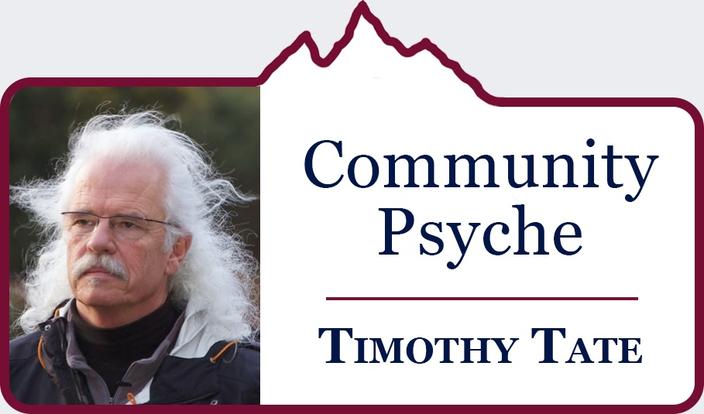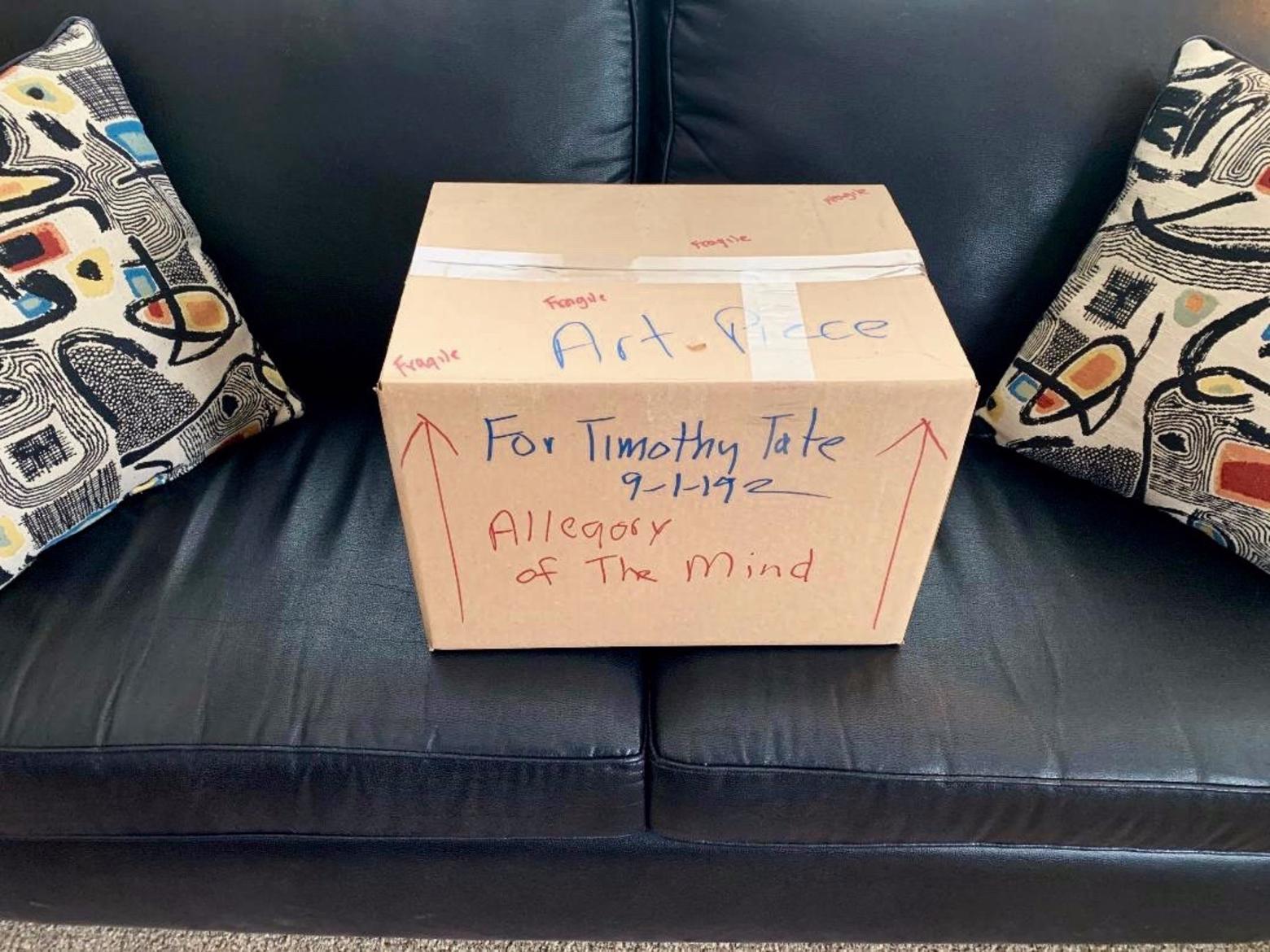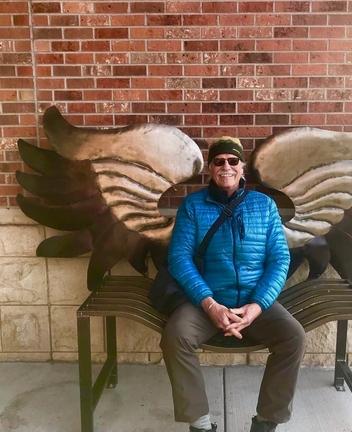Back to StoriesThe Top 5 Resolutions Made By Clients To A Mountain Town Psychotherapist
January 8, 2020
The Top 5 Resolutions Made By Clients To A Mountain Town PsychotherapistTimothy Tate examines the kinds of transformation many seek
The turning of a year is (in)famous for the tradition of making personal resolutions. We dream of a fresh start each New Year, resolving, with a wink, to... you fill in the blank. Typically we focus on changing habits or trying to control excesses, but it can also mean coming into the clear with vows to make a fresh start, to turn a page.
“I resolve to be kinder” requires no more energy than you have, it comes at no personal cost, and I guarantee you, putting it into practice will make you feel better. You might help someone else save their life. At the very least you will improve the quality and capacity of your own life. Kindness has no prerequisite, but repetition turns it into a habit. You can even start doing it right now.
Working to break destructive habits is hard work; most of us resist it. Perhaps it is a function of aging that colors my capacity to indulge in talk that is fanciful or meaningless. Or maybe it is how useless words taint my capacity to take folk's promises to try to be different sincerely. No one can tell you to change; it has to come from within.
My job as a therapist is to blend compassion with directness as I listen to clients describe what they wish to change about behaviors that they come to conclude are troublesome.
Do I agree to accept words as meaningful even though my “built-in-shock-proof-crap-detector” is buzzing, warning of words spoken simply to speak them?
Words need to translate into action.
Don't we all know when we are speaking the truth or cloaking the truth in bullshit? Or is it me, fending off cynicism with patient understanding that this time it’s going to be different.
The ancient Zen riddle comes to mind: “Those who speak do not know. Those who know do not speak.”
But what is a psychotherapy practice if it does not allow for us to practice making change that all by ourselves might be daunting?
The advent of this New Year brings a mixed bag of complex content into my practice. There are those of us who were blessed with our children and their loved ones coming home for the holidays, and the bittersweet farewell as we take them to the airport.
There is the “holidaze” of over drinking and eating too many pounds of cleverly disguised sugar and fat that can initiate a convincing post-holiday depressive episode coming down from the buzz.
There is the shaking off of the overindulgence and girding the persona for the post-holiday workplace onslaught.
There is the sublime tenderness of touching heartfelt moments of family joy, be it around the table or tree or Menorah that simmer in our memory brought back to life by such moments captured in photographs.
And there can be the heaviness of disappointment, of loneliness, alienation, feeling alone and shunned, wondering how did I find myself into isolation?
In the wake of the above come well-meant, good-intentioned New Year resolutions, inspired by the possibility of doing better by our responsible self and in the social connections, even realizing and coming to terms with the fact that so much is beyond our control.
The top five New Year’s resolutions that I hear in my practice are: #1: Stop drinking so much alcohol. #2: Lose weight. #3: Exercise more. #4: Be a better partner/person/friend. And #5: Be more fiscally responsible. If I were giving counsel on these five resolutions it would look like this.
#1. Stop drinking so much alcohol
What is too much alcohol? Well, here is where the rationalization complex kicks into high gear. If we are to listen to our AA brethren, any alcohol is too much. If we listen to how people describe their personal negotiations around this subject then we hear: “I deserve a glass or two of wine, or bottles of beer, or shots of whiskey. Did you not hear me tell you the kind of day I had?” Or, “I just want to mellow out.” Or, “I can handle the drink, I just got too carried away with the good times.” Or, “Man, she/he can really handle heavy drinking with no apparent signs of hangover.”
And, of course, the chorus so many have sung at some point in their lives: “Let’s Party!”
Concomitant with too much drinking is too many drugs. I am not addressing this habit here, suffice it to say that smoking pot daily falls under the “repetition compulsion” zone, meaning that any compulsive behavior is a compensation for anxiety and sets the stage for addiction.
The deeper question that I explore with people regarding compulsive behavior and addictions is not how much something is being done, but answering why we do things. It is a journey inward. Doing that gives us the power to change.
#2. Lose weight
What a bugger this one is. Have we not all, especially in our outdoor-oriented mountain towns, chimed in on this chorus? Who actually checks their medical BMI numbers and develops a daily strategy to stay in the zone of such a number other than the athletes in our community or the disciplined gym rats and fitness geeks who seemingly thrive under such steadfast discipline?
The shadow of repetition compulsion is cast upon us here as well, slipping us into darkness with either eating disorders or morbid obesity. Clients in my practice have followed The Red Zone diet, gastric bypass surgery both in the states and Mexico, and various diets.
The questions in therapy is “What/who are you feeding?" And "what is the hole in your psyche you are trying to fill?” Or "what do you fantasize weight or conversely skinniness will protect or hide?"
A sensible approach that I suggest, besides the typical eat three square meals a day and stay away from carb heavy snacks, is the approach to healthy eating described in the well-respected book Eat Right For Your Blood Type by Dr. Peter D’Adamo. I personally have a weight number in my head that I will not trespass.
#3. Exercise more
The simple answer is yes. I don’t think it's instructive to go all “cheerleader” here and shout out about the virtues of pushing our bodies. However, like the problem of over-indulging with alcohol and eating, there is, in many towns, obsessive body-image issues that are addressed by physically working out and not reflecting on the insecurities and inner voice telling us we must be perfect behind it all.
Ironically, having a healthy outlook about working out has a connection to understanding care of the self, and it relates to resolutions #1 and #2.
This is an issue of both body and mind.
It wasn’t that long ago, and it’s still true for many of us humans on the planet, that physicality meant survival. If we don’t push our bodies then our bodies will push us into discomfort and disease. Bodies love to be worked, it’s simply a question of how much and how often when we chant: “I need to exercise more!” And our workouts result in activation of endorphins that deliver an analgesic effect, i.e. we feel good.
This is an issue of both body and mind. It wasn’t that long ago, and it’s still true for many of us humans on the planet, that physicality meant survival. If we don’t push our bodies then our bodies will push us into discomfort and disease.
Of course, exercise can be a tool for helping to meet our goals involving resolutions #1 and #2.
I am not a physical therapist nor am I physical trainer but I do know that finding a sustainable routine is key.
Those of you who live in this town see me walking around the block between sessions for a brisk six minute constitutional every hour. Can we not all claim six minutes every hour regardless of the weather to take a brisk walk? Others have a strict running or gym regime. I ponder how it is that seemingly, no matter when I go to the gym for my once/twice a week workout, that the same people are there. Fit folks tend to stay fit. It is never too late to become “fitter.” Amid the rat race, you need to make time for yourself.
Obviously the advent of cellular devices have ambushed our mobility into a sedentary trance state, but as the author Kurt Vonnegut’s character says: “So it goes.” Except that it doesn’t have to be that way.
Most resolutions that result in changed behavior start as achievable baby steps and pacing of progress. Walk a block today? Next week shoot for two. When the body becomes healthier, it is amazing how it can move the mind to a different more hopeful place.
#4. Be a better person/partner/friend
Now this resolution is within my primary scope of practice. There are two ways to become a better person or partner: Face your own shadow and mind your projections.
Shadow is that part of ourselves we don’t wish to acknowledge but is necessary to do so, and projections are how we deflect dealing with those things by “projecting” our own insecurities, wounds, past traumas and personal frustrations onto other people.
Blaming others, a form of projection that displaces personal responsibility for our trouble onto the other, and behaviorally acting out our shadow, unconsciously behaving from our “darkside,” requires conscious, deliberate intention to change or it can destroy relationships with the people we love.
This work is the task of psychotherapy.
Therapists can intervene, diagnose and create treatment strategies that allow us to enter safe reflective mind states, but unless we tend to our darkside and become aware enough to manage our impulses to project blame onto others we will find ourselves making this same resolution next year and potentially with damage done to the people we value in our lives.
#5. Be more fiscally responsible
Ah yes, money. Man do I need to make this my resolution. The answer is no, life is not all about the money. When it comes to the important stuff, money can’t buy us anything that we don’t already possess, in terms of living more purposeful, satisfied inner and outer lives. I’m not saying that having money, versus not having it, doesn’t make a difference in reducing anxiety and worry, but contrary to the mountain town mantra, the person with the most toys often does not come out ahead in the search for personal meaning.
And yet our consumerist society is constantly trying to tell us otherwise.
The demands of money on our collective and personal psyches cannot be overestimated. Conflict over it can destroy seemingly stable relationships.
I know of another therapist in Bozeman who has cultivated a specialty in helping couples navigate the process of building a new home so that the inevitable stress associated with the decision-making doesn’t tear them apart. Of course, the key is being as completely honest as possible about the expectations a couple has. A new home is not going to solve un-tended issues, especially if issues involving the shadow and projection are in play. Doing so enables couples to build a life together.
Whether or not, like my personal ethic “money is the root of all evil” is still true, not having enough is equally sinister in the sense of inadequacy or struggle it creates and can become a barrier to us having enough time to let go of the shackles of financial responsibility.
It’s easy to understand why a person who, through the learned sense of obligation they feel to support the family, pay the mortgage or put their kids through school feels like they are going underground into the metaphoric mines every day, convinced they are destined to having no alternative but drudgery.
What is enough and how money is married to personal security is an advanced riddle to solve. The obvious paradox is that we can work/worry ourselves sick trying to gain enough money to be secure. Fiscal responsibility must fall under the column of responsible management like many of the other resolutions demand.
The obvious paradox is that we can work/worry ourselves sick trying to gain enough money to be secure. Fiscal responsibility must fall under the column of responsible management like many of the other resolutions demand.
The trouble with money, in the context of this column, is that its value has changed so dynamically since the end of World War II that not having an abundance, for some, means not having enough.
The worry about money and the compulsion to over-work combine to create this hideous psychological state of chronic anxiety that ironically costs buckets of dollars to correct.
I am not offering any overworked greasy platitudes here about cash, for certainly I am not one to preach about fiscal responsibility having been at the mercy of “poverty-as-a-virtue” missionary parents and coming of age in the Sixties.
All I know is that my credit card is devil spawn, aging is not a sentence nor is retirement an option, and my debit card determines what I spend (unless it's the holidays).
Resolutions—to resolve, to be resolute—are not superficial throw-away constructs. In fact they are hefty terms when applied according to their definition. But we all make ‘em and break ‘em so we share common ground.
Now a postlude about resolutions that must be taken seriously:
We live in weighty times with many of us carrying loads that can sometimes seem to be too heavy to bear. I share this story in closing to convey the gravity of resolve—of how a certain kind of resolve can be deadly and inflicts trauma on others.
What happens if I quietly resolve to end my life?
I was confronted by the circumstances of one such person who reached this resolution days before I took my annual holiday two week leave.
A message was left on my office phone’s answering machine by someone I did not know but who was a relative of the person in question, who had not been in my practice for many months, though our visits had gone back years.
Her struggle reflects the times in which we live—the cruelty, despondency, lack of concern for each other and for nature, that permeates on a social level and part of it, I believe, can be traced to the poor examples of human behavior emanating from our nation’s capital among elected officials. We need more healthy role models and our young people need them most of all.
The message on my phone began with these fateful words, “I hate to leave such a message on your voicemail but Maggie (not her actual name) passed. She left something for you and I would like to deliver it to you before we leave town tomorrow.”
After my next session with a client I returned the call and we spoke briefly, me asking if Maggie had taken her own life. The survivor confirmed she had. I told the person how to get to my office and the caller wanted to deliver the package personally.
I took a picture of the package resting on the couch where Maggie once sat.
The point of doing so is to drive home the force of a final resolution become manifest.
As you can see in the image, above, the box is addressed to me, labeled “Allegory of the Mind” and described as an “Art Piece" that is revealed by opening it up (see photo below).
I am sharing it because I am convinced Maggie would have had no objections. I believe she would have wanted it to become a focus for reflection, a reminder of the pain that is carried forward.
The contents reveal the art and a term paper written for a class she took on mythology.
Maggie had made it her mission to comprehend the influence of the mythos realm in the domain of the human psyche. By that, she was referring to the universal human traits recognized by the ancients of our species and explained in the personalities of the gods who were not perfect, but flawed. Yes, they, too “had issues.”
Maggie finished her paper with a reference to the wild Maenads (“raving ones”) of Diyonsysus fame who, drunk on wine and ecstasy, bore the thyroid, a staff crowned with ivy and wearing the skin of a panther, and wreaked havoc. That’s right, being focused on the material stuff we often covet—the consumerist culture and the conspicuous consumption we are told to emulate—can drive one crazy.
Maggie had successfully taken up her own resolutions. She no longer drank but she did suffer from bi-polarity and Obsessive-Compulsive disorder. She knew they were not “her fault.” Still, she felt trapped if made to work or live indoors and loved her cat with deep abiding affection.
She was resourceful, intelligent and passionate about the natural world, horrified by Gaia’s human-inflicted condition.
She was a member of her community and yet she felt alone.
What prompted her decision is unknown to me, but I bet she was tired of the world’s insanity that she could not affect, despite her heroic efforts to find peace. I do know that she resolved to commit suicide.
Maggie was and is not an enigma. “The West,” this region long associated with dreams of creating "a new life" and fresh starts has, in the states of our region, among the highest suicide rates in the country. There is loneliness in our cities and loneliness in the remote wide open spaces.
The solemn nature of this silent resolution speaks volumes to the true meaning of resolution—tragic resolutions, to escape a pain that cannot, even with the best of intentions, be shaken. The suicides witnessed in my practice over the decades have been kept secret from others. We need to have open discussions about the mental anguish and pain many of us are living with. A true compassionate society takes mental health seriously and understands its connection to our physical bodies.
There is another resolution we can make that affects the lives of others around us—and that is, each of us can “resolve” to be better people by being more empathetic, to listening to others, including people we don’t know well, as a way of helping them lift away some of their painful weight, of letting them know they are seen, of not being sparing or stoic in expressions of love.
How we identify and take care of those in existential crisis is not the purpose of this column. Obviously, I am not condoning suicide, but we need to stop treating it as a stigma and taboo, tucked out of sight where our happy communities don’t have to ponder the hardships of others. This is our shadow issue that we must confront together.
Those five resolutions mentioned above are about “self-improvement.” There is another resolution we can make that affects the lives of others around us—and that is, each of us can “resolve” to be better people by being more empathetic, to listening to others, including people we don’t know well, as a way of helping them lift away some of their painful weight, of letting them know they are seen, of us not being sparing or stoic in expressions of love.
“I resolve to be kinder” requires no more energy than you have, it comes at no personal cost, and I guarantee you, putting it into practice will make you feel better. You might help someone else save their life. At the very least you will improve the quality and capacity of your own life. Kindness has no prerequisite, but repetition turns it into a habit. You can even start doing it right now.
If you or someone you know is having suicidal thoughts, don’t hesitate to reach out for help. The National Suicide Prevention Lifeline is open 24 hours a day at 800-273-8255








